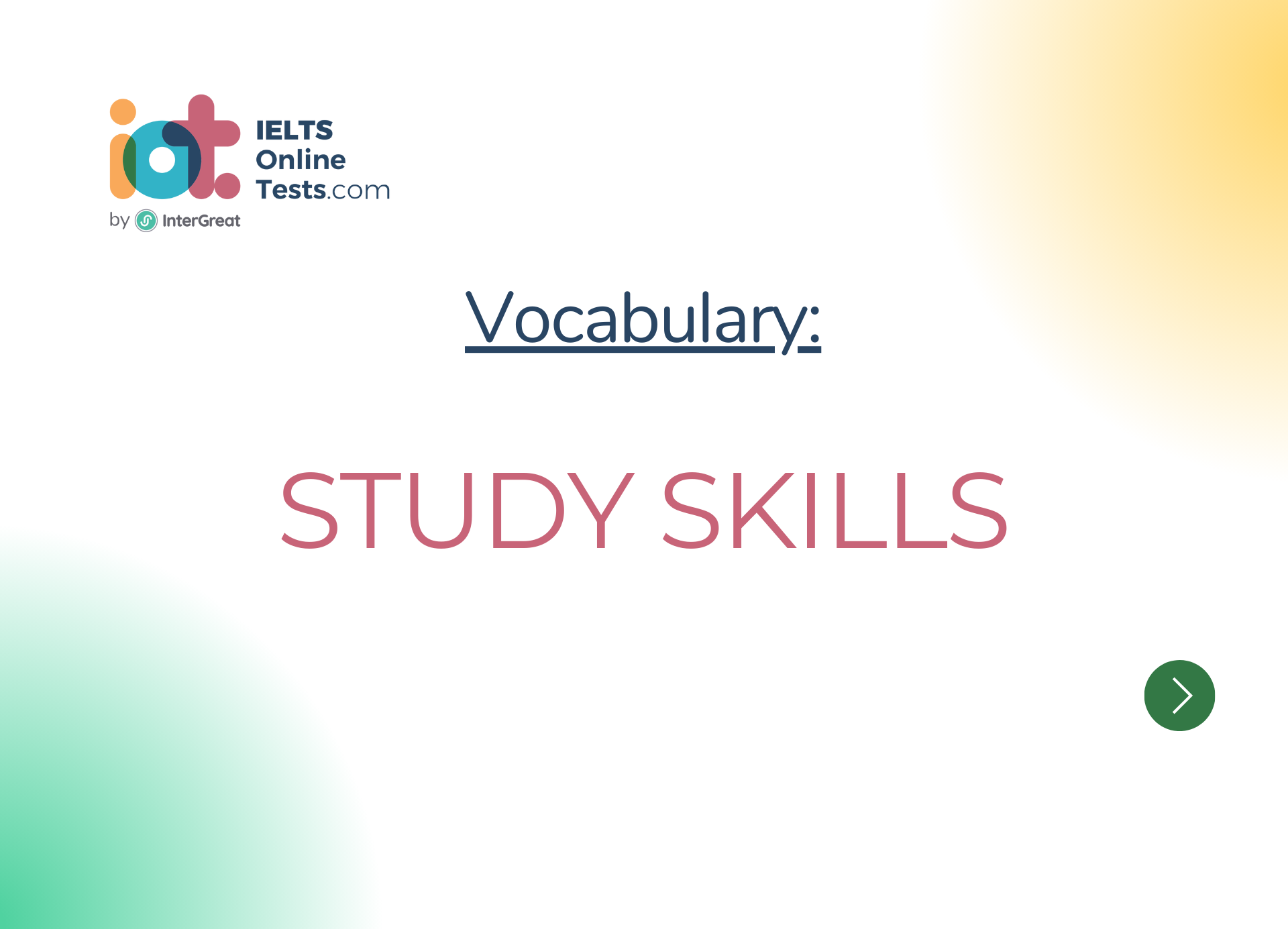
Study skills
Here are some vocabulary words related to study skills for the IELTS band score range of 4.5-6.0:
Note-taking
The practice of writing down important information during lectures or while reading.
Time Management
The ability to plan and use time effectively to balance study and other activities.
Organization
The skill of arranging study materials and managing them in a systematic way.
Critical Thinking
The ability to analyze and evaluate information to form well-reasoned judgments.
Active Listening
Engaging fully in listening to the speaker during lectures or discussions.
Reading Comprehension
Understanding and interpreting the meaning of written texts.
Problem Solving
The process of finding solutions to difficulties or challenges.
Memory Techniques
Strategies for improving memory and retaining information.
Mind Mapping
A visual technique that helps organize information in a hierarchical and interconnected way.
Flashcards
Small cards with information on one side used for self-testing and quick review.
Study Group
A small group of students who meet regularly to study and discuss course materials.
Study Plan
A schedule outlining study goals and tasks over a specific period.
Revision
Reviewing and relearning material to reinforce understanding.
Practice Tests
Tests taken to assess knowledge and identify areas for improvement.
Critical Reading
Analyzing texts to understand arguments, evidence, and perspectives.
Analytical Writing
Writing that involves evaluating and presenting reasoned arguments or analysis.
Test-taking Strategies
Techniques for approaching different types of exams effectively.
Learning Styles
Different ways individuals prefer to learn, such as visual, auditory, or kinesthetic.
Self-discipline
The ability to control one's actions and stay focused on study tasks.
Motivation
The driving force that pushes individuals to achieve their study goals.
Problem-solving Skills
The ability to identify challenges and find effective solutions.
Inquiry
The process of seeking information and asking questions to deepen understanding.
Synthesis
Combining different pieces of information or ideas to form a coherent whole.
Abstract Reasoning
Thinking in terms of concepts and ideas rather than concrete examples.
Study Environment
The physical and social surroundings where studying takes place.
Visual Aids
Charts, graphs, diagrams, or illustrations used to enhance understanding.
Information Literacy
The ability to locate, evaluate, and effectively use information.
Goal Setting
Establishing specific, achievable objectives for study and academic progress.
Analyze
To examine or study something in detail.
Comprehend
To understand the meaning or significance of something.
Evaluate
To assess or judge the quality or value of something.
Summarize
To briefly state the main points or essential information.
Revise
To review, edit, or make changes to improve understanding or quality.
Process
A series of actions or steps taken to achieve a particular outcome.
Concept
An abstract idea or general notion.
Efficient
Performing tasks effectively with minimal wasted effort or time.
Active Recall
The process of trying to remember information without prompts.
Deductive Reasoning
Drawing conclusions based on general principles or premises.
Inductive Reasoning
Drawing conclusions based on specific observations or evidence.
Analytical Skills
The ability to analyze and interpret information and data.
Concentration
The ability to focus attention and avoid distractions while studying.
Motivated
Having a strong desire and enthusiasm to achieve study goals.
Effort
The amount of hard work and dedication put into studying.
Retention
The ability to remember and recall information over time.
Practice
Repeatedly performing an action or skill to improve proficiency.
Learning Strategies
Various approaches and techniques used to enhance learning.
Efficient Reading
Reading quickly while still comprehending and retaining information.
Effective Writing
Writing that clearly communicates ideas and arguments.
Analyzing Data
Examining and interpreting data to draw conclusions.
Problem-solving Skills
The ability to identify challenges and find effective solutions.
Study Break
Short periods of rest or relaxation taken during study sessions.
Goal-oriented
Having a clear focus on achieving specific study objectives.
Time Block
Scheduling dedicated periods of time for focused studying.
Remember to practice using these words in various sentences and study contexts to enhance your understanding and usage. Developing strong study skills will help you become a more effective and successful learner, especially during your IELTS preparation and future academic endeavors. Good luck with your studies!




